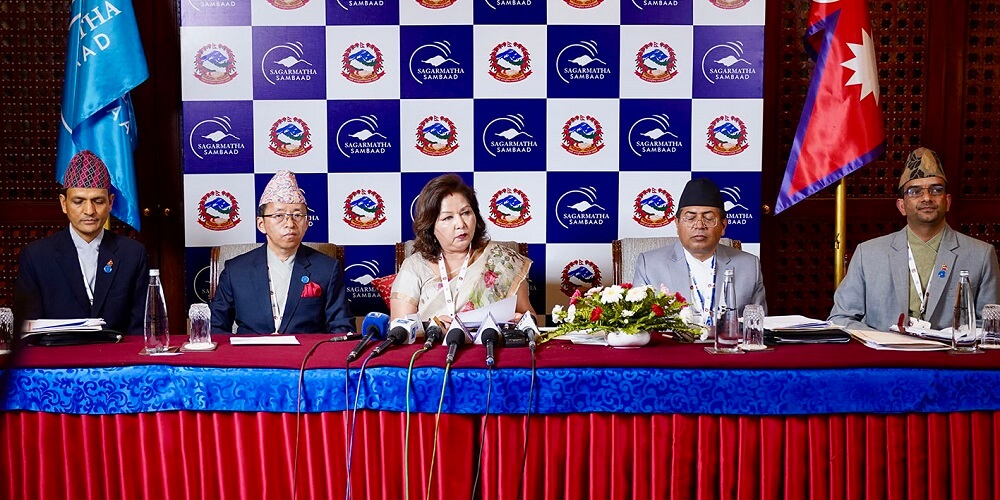
Sagarmatha Sambad 2082 Opens with a Global Climate Focus
The Sagarmatha Sambad 2082 officially began on Jestha 2 (May 16, 2025), with the inaugural session and full proceedings held on the same day.
After the sessions, Foreign Minister and Dialogue Management Committee Coordinator Dr. Arjun Rana Deuba spoke to the media. In a short briefing from the venue, he confirmed that both sessions were completed smoothly.
PM Oli Inaugurates Dialogue, Unveils National Climate Document
Prime Minister KP Sharma Oli inaugurated the event by unveiling the official Sagarmatha Sambad banner.
In his opening remarks, the Prime Minister spoke about the rising global pressure from climate change and other environmental crises. He called attention to the importance of platforms like this and the role of open, international dialogue in tackling complex global challenges.
Before delivering his speech, he formally launched Nepal’s third Nationally Determined Contribution (NDC)—the government’s updated climate commitment—and handed it over to COP-29 President Mukhtar Babayev. Foreign Minister Dr. Rana delivered the welcome address.
Climate Impacts on Mountains Take Center Stage
Mukhtar Babayev, representing the President of Azerbaijan and serving as Chair of COP-29, delivered a keynote address.
He focused on how climate change affects mountain ecosystems and highlighted the need for collaborative solutions. He emphasized that these impacts are not just regional concerns, but global ones.
Regional Leaders Share Their Concerns
India’s Environment Minister, Bhupender Yadav, also addressed the gathering. He spoke about the widespread impacts of climate change — not only on mountain regions but also in lowlands and beyond.
In her media briefing, Dr. Rana shared that Minister Yadav had expressed concern over how fast these changes are accelerating.
Vice-Chairperson of China’s National People’s Congress, Xiao Jie, echoed similar thoughts, warning about the severe and long-term consequences of inaction.
UN Secretary-General António Guterres joined the session through a pre-recorded video message, reinforcing the urgency of climate cooperation.
A Gathering of Global Voices
The opening session brought together a wide range of voices — heads of government, policy leaders, technical experts, and environmental stakeholders worldwide.
After the formal launch, a full working session followed, structured along international conference lines.
Delegates from participating countries, global institutions, and regional organizations participated in discussions centered on climate resilience and mountain futures. Dr. Rana chaired the session.
19 Delegations Present Their Statements
Altogether, 19 delegations delivered official statements, including 13 national and six international and regional organizations.
Each representative focused on different aspects of climate change, especially how it shapes the future of mountain regions and human society.
Countries represented:
-
Nepal
-
Bangladesh
-
Bhutan
-
India
-
Japan
-
United Kingdom
-
United Arab Emirates
-
Qatar
-
Kyrgyzstan
-
Brazil
-
Egypt
-
Oman
-
Pakistan
Organizations represented:
-
United Nations
-
World Bank
-
Asian Development Bank
-
SAARC
-
BIMSTEC
-
ICIMOD
Collective Appeal for Global Solidarity
One message was repeated throughout the statements: the climate crisis demands global solidarity, particularly its effect on mountain communities.
Several delegates called for joint action, shared responsibility, and long-term cooperation to protect ecosystems and ensure a liveable future for the next generation.
Conference

